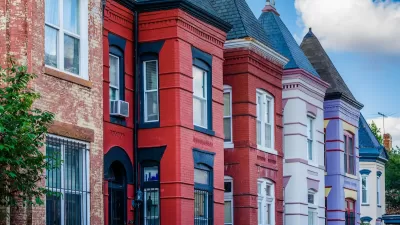Households seeking lower-cost rental housing units are not seeing housing supply go up as quickly as higher-income families after upzoning.

An Urban Institute study of zoning reforms in more than 1,000 cities found that low-income renters are the slowest to experience the benefits of zoning changes and an increased housing supply, whose units are concentrated at the higher end of the spectrum, reports Molly Bolan in Route Fifty.
“That’s not to say updating land-use regulations aren’t beneficial to households across the income spectrum, the report notes. The supply change for less expensive units is positive but isn’t significant enough to be definitively a direct result of zoning reforms.” But “By building higher-cost units, higher-income households can leave older buildings which are then available to lower-income families in a process known as ‘filtering.’”
Meanwhile, “The study also found that cities that tightened restrictions saw median rents go up in the years following implementation.”
But the impact of zoning reforms that boost construction is complex, with new developments and amenities leading to gentrification and displacement. “In these cases, more immediate initiatives, like rental assistance programs, are all the more important.” Ultimately, the researchers conclude that “there really is no silver bullet, and we have to do everything—we have to attack this problem from every angle.”
FULL STORY: Do Zoning Reforms Benefit Renters?

Maui's Vacation Rental Debate Turns Ugly
Verbal attacks, misinformation campaigns and fistfights plague a high-stakes debate to convert thousands of vacation rentals into long-term housing.

Planetizen Federal Action Tracker
A weekly monitor of how Trump’s orders and actions are impacting planners and planning in America.

In Urban Planning, AI Prompting Could be the New Design Thinking
Creativity has long been key to great urban design. What if we see AI as our new creative partner?

Cal Fire Chatbot Fails to Answer Basic Questions
An AI chatbot designed to provide information about wildfires can’t answer questions about evacuation orders, among other problems.

What Happens if Trump Kills Section 8?
The Trump admin aims to slash federal rental aid by nearly half and shift distribution to states. Experts warn this could spike homelessness and destabilize communities nationwide.

Sean Duffy Targets Rainbow Crosswalks in Road Safety Efforts
Despite evidence that colorful crosswalks actually improve intersection safety — and the lack of almost any crosswalks at all on the nation’s most dangerous arterial roads — U.S. Transportation Secretary Duffy is calling on states to remove them.
Urban Design for Planners 1: Software Tools
This six-course series explores essential urban design concepts using open source software and equips planners with the tools they need to participate fully in the urban design process.
Planning for Universal Design
Learn the tools for implementing Universal Design in planning regulations.
Appalachian Highlands Housing Partners
Gallatin County Department of Planning & Community Development
Heyer Gruel & Associates PA
Mpact (founded as Rail~Volution)
City of Camden Redevelopment Agency
City of Astoria
City of Portland
City of Laramie





























